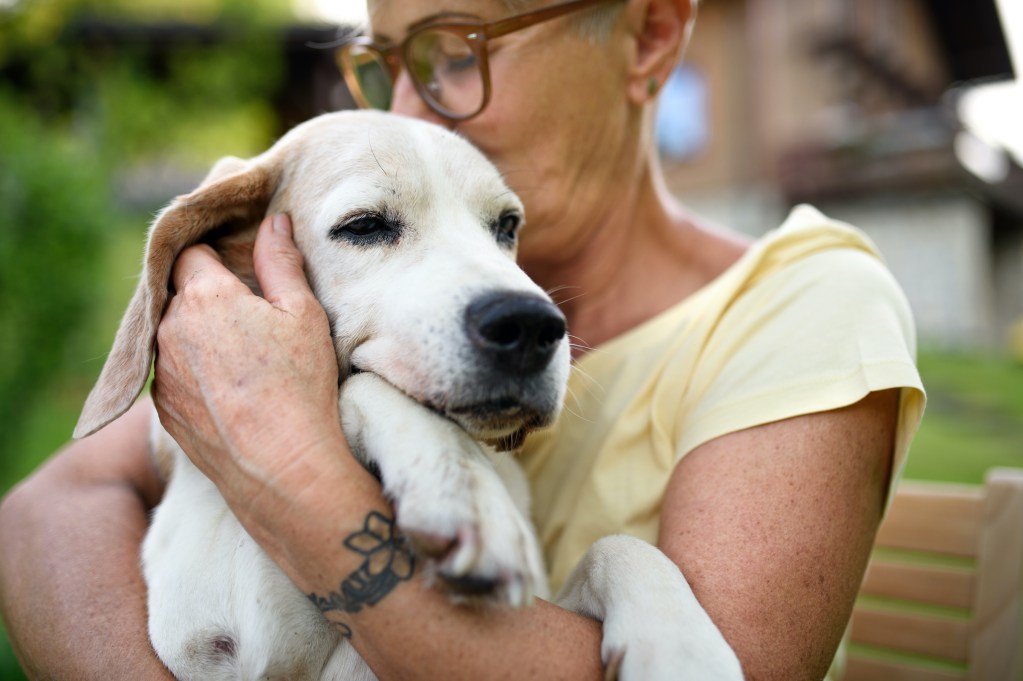No one wants to think about their dog’s final moments, but it’s an inevitable part of life that every pet parent will have to face. Hopefully, though, knowing what to expect can replace some of the fear and uncertainty with a sense of peace. Thinking through this life transition may be emotionally taxing, but asking the important questions (such as, do dogs know they’re dying? Do dogs fear death?) can make the process as easy as possible for everyone — especially you.
Take a deep breath, give your dog a little love, and scroll on if you’re feeling ready to learn about this important — yet difficult — time. We’ll let you know how to care for your senior dog, how your veterinarian will be helpful during this time, and what to expect as your dog’s final moments draw near. Trust us — you’re not in this alone.

Do dogs know they’re dying? You might be surprised
We know how scary this question can be, but Dr. Ann Brandenburg-Schroeder hopes to provide some serenity for pet parents going through it. After experiencing the peaceful passing of her own beloved dogs, she found her calling to provide an at-home euthanasia service and give that gift to other pets and owners. On her website, Beside Still Water, she assures owners, “When we assist an animal to die, we are really doing so at their request. Animals know when they are dying.”
Before you get too sad or worried, though, understand that this process isn’t nearly as scary for an animal as it sounds.

Do dogs fear death the same way humans do?
Knowing about one’s upcoming death may sound frightening, but Dr. Brandenburg-Schroeder hopes to provide pet parents with some peace.
“They are not afraid of death, at least not in the sense that we people are,” She explains. “Nearing death, they come to a place of acceptance and try to communicate that to us.” The ways they communicate this, though, don’t always look the same from dog to dog.
Next, let’s find out how exactly a dog may communicate that they’re ready to pass on.

What do dogs do when they are about to die? Is it different from how they normally act?
Since dogs who are approaching death are often aware and ready, they may begin to act differently in their last moments. Before you read too much into these signs, though, know that many of them can appear due to other (much more minor) causes. If you’re feeling unsure, please don’t hesitate to enlist the help of your veterinarian. After all — that’s why they’re there.
Dr. Ann Brandenburg-Schroeder lists the following as common clues that a dog is ready to cross the rainbow bridge:
- Disinterest in attention or interaction
- Lack of eating or drinking
- Stops enjoying favorite activities
- Incontinence
- Hiding or wanting to be alone
- Limitations due to pain
Your dog’s warning signs may differ from those on this list, or they may be exactly the same. As a pet parent, you’re the expert on your specific animal.

What happens hours before a dog dies?
As the time approaches, you’ll notice an increase in some of these behaviors, such as incontinence and lack of appetite, as well as new ones. Lots of pups in the final moments of their lives will have heavy or labored breathing. Some lie down and refuse to move while their heart beat slows.
If your animal takes this final step, you should contact your vet immediately to discuss how to ease them into a forever sleep. They may be able to go on their own peacefully and not require any interventions. Assuming they respond well to it, sit with your friend and talk quietly or put your hand near them (your dog might not want to be touched, but your scent will comfort them plenty). Watch their chest until you no longer see breathing to know that they have moved on.

Tips for comforting a dying dog in their final days of life
As a dog reaches their final days, there are many ways you can keep them comfortable and content. Senior dog care isn’t always difficult, especially once you’ve done some research, so just know — you can do this.
Regaining some sense of normalcy may be comforting to your dog, but it may also help to keep in mind the symptoms your buddy has been battling if you don’t know where to start. Pain management can take the form of mediation, mobility support, or a number of different therapies — your vet will likely recommend something. If you’re able to keep your beastie hydrated, even a little bit, this will also be of huge comfort to them. Once that is taken care of, you can try your best to give your four-legged friend some fun and loving final moments.
If your pet’s passing is planned, there are a few additional ways you can comfort them as the moment approaches. Hillcrest Veterinary Clinic posted a message from one of its veterinarians that went viral in 2018, encouraging pet parents to stay with their fur babies until the process is complete. The heartbreaking post explained how pets often look around for their owners in their last moments when their humans choose not to remain in the room. Instead, offering love until their passing can be a more peaceful experience for everyone, especially your dog.
Whatever you’re feeling during this difficult time is totally OK. Just as no two dogs experience the end of life the same way, no two pet parents cope the same way. As long as you’re able to be there for your beloved furry friend, you’re doing just fine.
Remember to take advantage of your veterinarian’s support during this time, too. You can ask as many questions as you need to, and you don’t have to make difficult decisions on your own. This way, you can focus all of your attention on showering your best buddy with as much love as possible.




